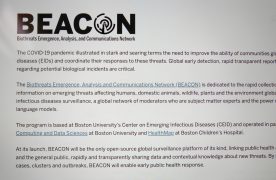Professor and author Elie Wiesel struck a theme of femininity before an audience of about 1,000 Boston University students and faculty on Monday, emphasizing the importance of women in pivotal Biblical events.
Wiesel, a Holocaust survivor and Nobel Peace Prize recipient, spoke at Metcalf Hall in the first of his three-part lecture series titled “Three Encounters with Elie Wiesel.”
Wiesel began his lecture, titled “In the Bible: A Judge Named Deborah,” with an introduction of Deborah, a judge and prophetess of Israel who led a successful campaign against the Canaanites in a story found in the Bible’s book of Judges.
“Deborah. . . played a crucial role in the outcome of the battle,” he said. “In fact some sources attribute to her Israel’s stunning military triumph.”
Wiesel drew similarities between Jews’ relationship with God in the Book of Judges and their relationship with him now.
“The period of the Judges was not the most luminous chapter of our people’s turbulent and proud history,” he said. “The people were Jewish and faithful only when things were going poorly, when the enemy was mighty, and Jews were spiritually weak, forlorn, easily seduced by alien idols.”
Wiesel also touched upon why the Jews returned to God.
“Then they returned to God because they needed him; they needed his divine intervention. Has it always been that way? Is it still that bad? Are we Jewish only when we suffer being Jewish? Are we Jewish only when the outside pressures are there?”
Wiesel then spoke about Yael, the woman who killed the leader of the Canaanite army by hammering a peg through his head, and went on to argue that women played essential roles in the Bible, starting with Eve.
“Adam was almost a tool in her hands: what she told him to do, he did. He wasn’t hungry, but she made him eat,” Wiesel said jokingly, as the audience laughed.
“All the time, women were actually those who made decisions,” Wiesel said, citing the importance of Ruth, Esther and Rahab in the Bible.
BU President Emeritus John Silber, who introduced Wiesel, emphasized the importance of Wiesel’s memoir, “Night,” which recounts his experience in the Nazi prison camps.
“In “Night’ [Wiesel] reveals the full horror of the Holocaust as an inscrutable evil,” Silber said. “”Night’ has made millions of young students aware of this tragedy in which all standards of civilization were abandoned.”
Silber said since Wiesel’s first lecture 34 years ago, the author has “made it his primary concern to arouse the consciousness of mankind to the realities of the Holocaust.”
Audience members said they were excited about seeing Wiesel at BU.
“I think that Elie Wiesel is a huge character and very, very inspirational to not just the Jewish people but also the whole world,” said College of Arts and Science freshman Ben Fishman.
“Elie is a faculty member who stands out, his name stands out on the paper when you see him on your schedule so when you have that opportunity it’s an opportunity you can’t pass up,” said School of Management freshman Albert Tawil. “That’s why BU takes pride in having him here.”
This is an account occasionally used by the Daily Free Press editors to post archived posts from previous iterations of the site or otherwise for special circumstance publications. See authorship info on the byline at the top of the page.












